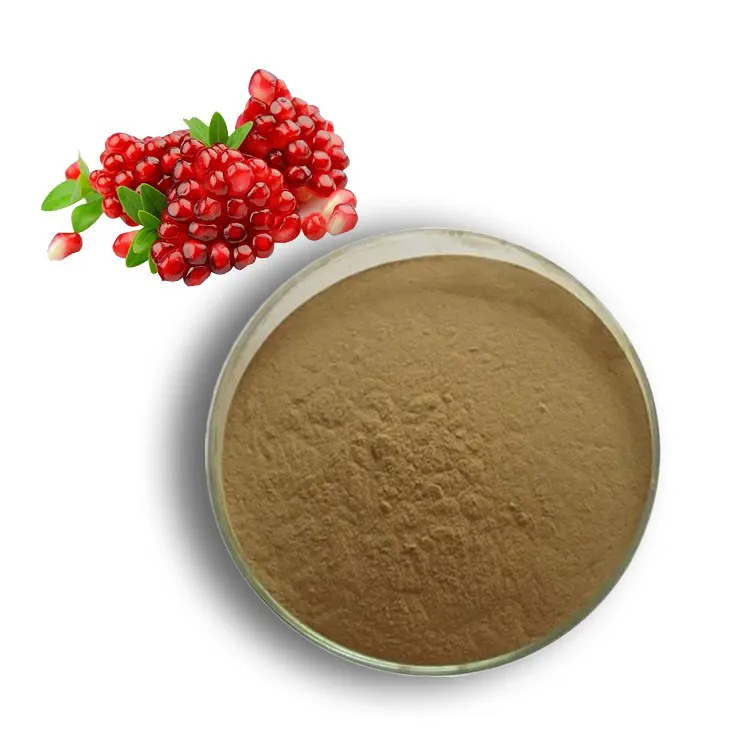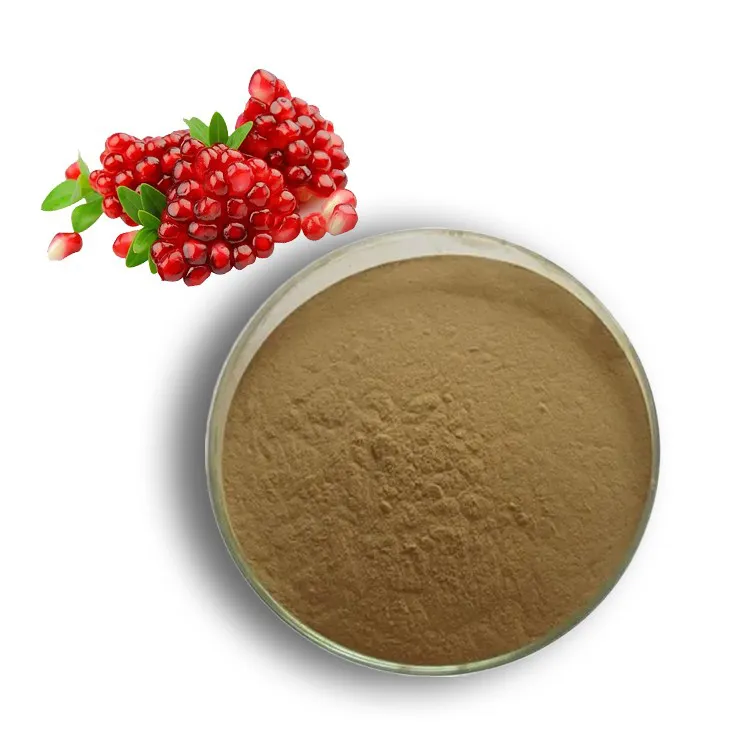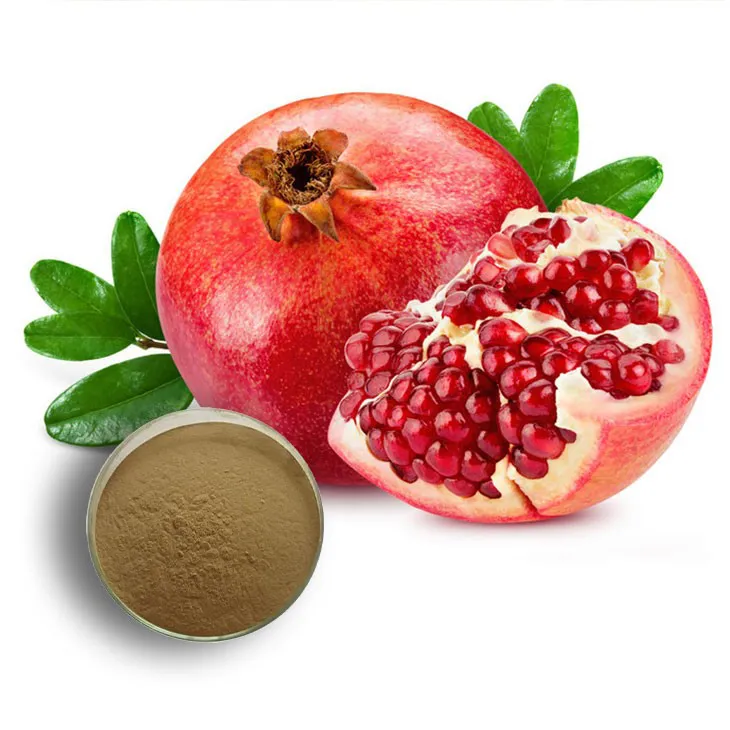- 0086-571-85302990
- sales@greenskybio.com
Pomegranate Extract: Is the Extract Effective for Weight Loss?
2024-11-13

1. Introduction
In recent years, the pursuit of natural and effective weight - loss aids has led to the exploration of various plant - based extracts. Pomegranate Extract has emerged as a potential candidate in this regard. Pomegranates are rich in a variety of bioactive compounds, which may have implications for weight management. This article aims to comprehensively analyze whether Pomegranate Extract is truly effective for weight loss by examining its influence on metabolism, appetite regulation, and fat - burning mechanisms from both scientific research and practical experiences.

2. Pomegranate Extract: Composition and Nutritional Profile
Pomegranate extract is derived from the pomegranate fruit, which is known for its numerous health - promoting properties. The extract contains a range of compounds such as:
- Polyphenols: These are powerful antioxidants that include flavonoids like anthocyanins, which give the pomegranate its characteristic red color. Polyphenols have been associated with various health benefits, including potential anti - inflammatory and anti - oxidative effects.
- Vitamins and Minerals: Pomegranates are a source of vitamins C and K, as well as potassium. While these nutrients are not directly related to weight loss, they play important roles in overall health and can support the body's physiological functions during a weight - loss journey.
- Fiber: Pomegranate contains dietary fiber, which can contribute to feelings of fullness and may aid in digestion. Fiber - rich foods are often recommended in weight - loss diets as they can help control appetite.

3. Impact on Metabolism
3.1. Boosting Basal Metabolic Rate
Some studies suggest that certain compounds in pomegranate extract may have the potential to increase the basal metabolic rate (BMR). The BMR is the amount of energy the body needs to perform basic functions at rest, such as breathing, circulating blood, and maintaining body temperature.
For example, research on animals has shown that polyphenols present in pomegranate extract may interact with the body's metabolic pathways. They could potentially enhance mitochondrial function, which is crucial for energy production in cells. Mitochondria are often referred to as the "powerhouses" of the cell, and by improving their function, the body may be able to burn more calories at rest. However, it is important to note that while these animal studies are promising, human studies are still needed to confirm these effects.
3.2. Influence on Insulin Sensitivity
Another aspect of metabolism that pomegranate extract may impact is insulin sensitivity. Insulin is a hormone that plays a key role in regulating blood sugar levels. When the body becomes insulin - resistant, it can lead to abnormal blood sugar levels and may also be associated with increased fat storage.
Preliminary research indicates that pomegranate extract may improve insulin sensitivity. This could potentially lead to better blood sugar control and may also have implications for weight loss. For instance, improved insulin sensitivity can help prevent excessive blood sugar spikes and crashes, which in turn can reduce cravings for high - calorie foods. However, more extensive research is required to fully understand the relationship between pomegranate extract, insulin sensitivity, and weight loss.

4. Appetite Regulation
4.1. Role of Fiber in Satiety
As mentioned earlier, pomegranate extract contains fiber. Fiber has a significant role in promoting satiety or the feeling of fullness. When consumed, fiber absorbs water in the digestive tract, which can slow down the emptying of the stomach.
This delayed gastric emptying sends signals to the brain that the body is full, which can help reduce overall food intake. For example, if a person consumes a product containing pomegranate extract before a meal, the fiber in it may make them feel less hungry, leading to a lower calorie consumption during the meal. However, the amount of fiber in pomegranate extract may vary depending on the extraction method and the form in which it is consumed (e.g., whole fruit, juice, or concentrated extract).
4.2. Impact on Hormonal Signals for Appetite
There is also some evidence to suggest that pomegranate extract may influence hormonal signals related to appetite. Hormones such as leptin and ghrelin play important roles in regulating hunger and satiety.
Leptin is produced by fat cells and signals to the brain when the body has enough energy stores, suppressing appetite. Ghrelin, on the other hand, is often referred to as the "hunger hormone" as it stimulates appetite. Some studies have proposed that pomegranate extract may modulate the levels of these hormones, although the exact mechanisms are not yet fully understood. If pomegranate extract can increase leptin levels or decrease ghrelin levels, it could potentially help in appetite control and, consequently, weight loss.

5. Fat - Burning Mechanisms
5.1. Lipolysis Induction
Lipolysis is the process by which the body breaks down stored fat into fatty acids and glycerol, which can then be used as a source of energy. Some research has suggested that pomegranate extract may induce lipolysis.
The polyphenols in pomegranate extract may activate certain enzymes involved in lipolysis, such as hormone - sensitive lipase. This enzyme is crucial for the breakdown of triglycerides, the main form of stored fat in the body. By promoting lipolysis, pomegranate extract may help the body utilize its fat stores more effectively for energy, which is a desirable outcome in weight - loss efforts. However, the degree to which this occurs in humans and its long - term implications for weight loss are still being investigated.
5.2. Inhibition of Fat Absorption
In addition to promoting fat breakdown, pomegranate extract may also inhibit fat absorption in the digestive tract. This could be due to its ability to interact with the intestinal cells involved in fat absorption.
For example, some studies have shown that pomegranate extract can reduce the absorption of dietary fats by affecting the function of transporters in the intestinal lining. If less fat is absorbed into the body, it can lead to a reduction in overall calorie intake and potentially contribute to weight loss. However, it is important to note that excessive inhibition of fat absorption may also lead to potential nutrient deficiencies, as fats are essential for the absorption of certain vitamins and the proper functioning of the body.
6. Scientific Studies on Pomegranate Extract and Weight Loss
While there have been several in - vitro and animal studies exploring the potential of pomegranate extract for weight loss, human studies are relatively limited.
6.1. In - vitro and Animal Studies
In - vitro studies have provided valuable insights into the molecular mechanisms by which pomegranate extract may affect weight - related processes. For example, cell culture studies have shown how certain compounds in the extract can interact with cells involved in metabolism and fat storage.
Animal studies have also been quite revealing. In some rodent models, animals fed a diet supplemented with pomegranate extract showed reduced body weight gain compared to control groups. These animals also had improved metabolic parameters, such as better insulin sensitivity and lipid profiles. However, it is important to note that animals may not always respond in the same way as humans, and the results cannot be directly extrapolated to human populations.
6.2. Human Studies
In human studies, the evidence is less conclusive. Some small - scale trials have investigated the effects of pomegranate extract on weight loss. For example, a short - term study may have participants consume a pomegranate extract supplement while following a controlled diet and exercise regime.
While some of these studies have reported modest reductions in body weight or body fat percentage among participants taking pomegranate extract, the results are often confounded by other factors such as individual differences in diet compliance, physical activity levels, and baseline metabolic rates. Larger, more long - term, and well - controlled human studies are needed to accurately determine the effectiveness of pomegranate extract for weight loss.
7. Practical Considerations
7.1. Forms of Pomegranate Extract Consumption
Pomegranate extract can be consumed in various forms, including as a supplement, in juice form, or as part of whole - fruit consumption. Each form has its own advantages and potential drawbacks.
- Supplements: Pomegranate extract supplements are convenient and can provide a concentrated dose of the active compounds. However, the quality and purity of supplements can vary widely, and it is important to choose a reliable brand. Additionally, some supplements may contain other ingredients that could potentially interact with medications or have adverse effects.
- Juice: Pomegranate juice contains the extract along with other nutrients from the fruit. However, it is often high in sugar, and excessive consumption of sugary juices can lead to an increase in calorie intake, which may counteract any potential weight - loss benefits. It is advisable to choose unsweetened or minimally sweetened pomegranate juice.
- Whole Fruit: Consuming the whole pomegranate is a natural and nutritious way to obtain the extract. The fruit also provides fiber, which can contribute to satiety. However, it can be time - consuming to prepare and may not be as convenient as supplements or juice in some cases.
7.2. Potential Side Effects
While pomegranate extract is generally considered safe for most people, there are some potential side effects to be aware of.
- Allergic Reactions: Some individuals may be allergic to pomegranates or components of the extract. Allergic reactions can range from mild symptoms such as itching and rash to more severe reactions like difficulty breathing.
- Digestive Issues: In some cases, excessive consumption of pomegranate extract, especially in supplement form, may cause digestive problems such as nausea, vomiting, or diarrhea. This may be due to the high concentration of certain compounds or interactions with the digestive system.
8. Conclusion
Pomegranate extract shows potential in the area of weight loss through its possible effects on metabolism, appetite regulation, and fat - burning mechanisms. The presence of polyphenols, fiber, and other bioactive compounds in the extract provides a basis for these potential benefits. However, while in - vitro and animal studies have provided some encouraging results, human studies are still in their infancy and lack conclusive evidence.
Practical considerations such as the form of consumption and potential side effects also need to be taken into account. More research, particularly large - scale, long - term human studies, is needed to fully understand the effectiveness of pomegranate extract for weight loss. Until then, it cannot be definitively stated that pomegranate extract is an effective weight - loss aid, but it remains an interesting area of research with potential implications for future weight - management strategies.
FAQ:
Q1: How does pomegranate extract affect metabolism?
Pomegranate extract may influence metabolism in several ways. Some studies suggest that it contains compounds that can enhance mitochondrial function. Mitochondria are the powerhouses of cells and play a crucial role in energy production. By improving mitochondrial function, the body may be able to burn calories more efficiently. Additionally, certain components in pomegranate extract might affect hormonal balance related to metabolism, such as insulin sensitivity. Insulin helps regulate blood sugar levels, and improved insulin sensitivity can contribute to better metabolic health and potentially aid in weight loss.
Q2: Can pomegranate extract regulate appetite?
There is some evidence indicating that pomegranate extract could play a role in appetite regulation. It may affect the release of certain hormones in the body that are involved in signaling hunger and satiety. For example, it might influence the levels of ghrelin (the hunger hormone") and leptin (the "satiety hormone"). However, more research is needed to fully understand the extent of its impact on appetite and how it can be effectively used for weight management in relation to appetite control.
Q3: What are the fat - burning mechanisms of pomegranate extract?
The fat - burning mechanisms associated with pomegranate extract are complex. One proposed mechanism is its antioxidant properties. Pomegranate extract is rich in antioxidants, which can help reduce oxidative stress in the body. Oxidative stress can interfere with normal cellular functions, including those related to fat metabolism. By reducing oxidative stress, the extract may allow the body's natural fat - burning processes to function more optimally. Another possible mechanism is through the modulation of certain enzymes involved in lipid metabolism. For instance, it may affect the activity of lipase enzymes, which are responsible for breaking down fats.
Q4: Are there any side effects of using pomegranate extract for weight loss?
When used in moderation, pomegranate extract is generally considered safe for most people. However, some individuals may experience mild side effects such as gastrointestinal discomfort, including nausea or diarrhea. Additionally, if a person has an allergy to pomegranates, using the extract could potentially cause allergic reactions. It's also important to note that if pomegranate extract is combined with other weight loss supplements or medications, there could be interactions, so it's advisable to consult a healthcare provider before starting any new supplement regimen for weight loss.
Q5: How much pomegranate extract should be taken for potential weight loss?
There is no one - size - fits - all answer to this question. The appropriate dosage of pomegranate extract for weight loss can vary depending on factors such as an individual's age, overall health, and body weight. In general, research on the optimal dosage for weight loss is still limited. Some studies have used dosages ranging from a few hundred milligrams to a few grams per day, but more research is needed to determine the most effective and safe dosage specifically for weight loss purposes.
Related literature
- "The Effects of Pomegranate Extract on Obesity: A Review of the Current Evidence"
- "Pomegranate Extract and Metabolism: Unraveling the Connection"
- "Role of Pomegranate Extract in Appetite Regulation and Weight Management"
- ▶ Hesperidin
- ▶ citrus bioflavonoids
- ▶ plant extract
- ▶ lycopene
- ▶ Diosmin
- ▶ Grape seed extract
- ▶ Sea buckthorn Juice Powder
- ▶ Beetroot powder
- ▶ Hops Extract
- ▶ Artichoke Extract
- ▶ Reishi mushroom extract
- ▶ Astaxanthin
- ▶ Green Tea Extract
- ▶ Curcumin Extract
- ▶ Horse Chestnut Extract
- ▶ Other Problems
- ▶ Boswellia Serrata Extract
- ▶ Resveratrol Extract
- ▶ Marigold Extract
- ▶ Grape Leaf Extract
- ▶ blog3
-
Cranberry Plants and Skin - care Products.
2024-11-13
-
Phyllanthus Emblica Extract
2024-11-13
-
Yellow Pine Extract
2024-11-13
-
Purple Sweet Potato Extract
2024-11-13
-
Propolis Extract Powder
2024-11-13
-
Apricot Powder
2024-11-13
-
Almond Extract Powder
2024-11-13
-
Agaricus Blazei Extract
2024-11-13
-
Hedyotis Diffusa Extract
2024-11-13
-
Soy Extract
2024-11-13
-
Green coffee bean Extract
2024-11-13





















